Intercultural Crosstalk
Work and Activities That Connect Japan and Their Home Country -About First Encounter with Japan-
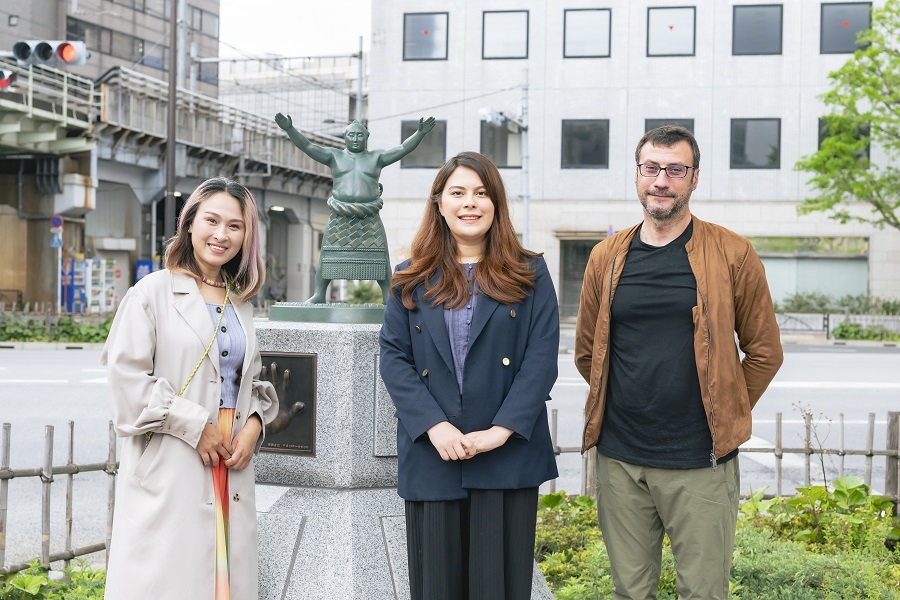
Profiles
Yung(From Thailand)
- Years of residence in Japan
- 16 years
- Native language
- Thai
- Favorite Japanese words
- nanndemonai (it's nothing)
- Favorite places in Tokyo
- Tokyo Sky Tree, Tokyo Tower, Shinjuku Gyoen
- Favorite food
- Sashimi, beef
- Hobbies
- Photography, watching movies, traveling
- Working in own country
- Overseas purchasing / Hotel area staff management
Micheli (from Brazil)
- Years of residence in Japan
- 17 years
- Native language
- Portuguese
- Favorite Japanese words
- ichinen tsuten(faith will move mountains)
- Favorite places in Tokyo
- Ueno Park
- Favorite food
- Japanese food: nikujyaga (meat and potato stew), Brazilian food: feijoada
- Hobbies
- Traveling abroad
- Working in Japan
- Japanese teacher (survival Japanese for elementary school students)
Dancho (from Bulgaria)
- Years of residence in Japan
- 17 years
- Native language
- Bulgarian
- Favorite Japanese words
- arigato (thank you)
- Favorite places in Tokyo
- Old coffee shops
- Favorite food
- I have many!
- Hobbies
- Reading, watching movies
- Working in own country
- Music teacher
Round 1: First Encounter with Japan
We are pleased to present a 3 part series of round-table discussions among 3 people who continue to engage in "work and activities that connect their home countries with Japan".
The 3 are living in Japan and are working and conducting activities that bridge their home countries and Japan in a variety of ways.
We asked them what the countries they come from are like, how they came to know Japan, and why they came to Japan, as well as how they started their current work and activities.
What is Your Home Country Like?
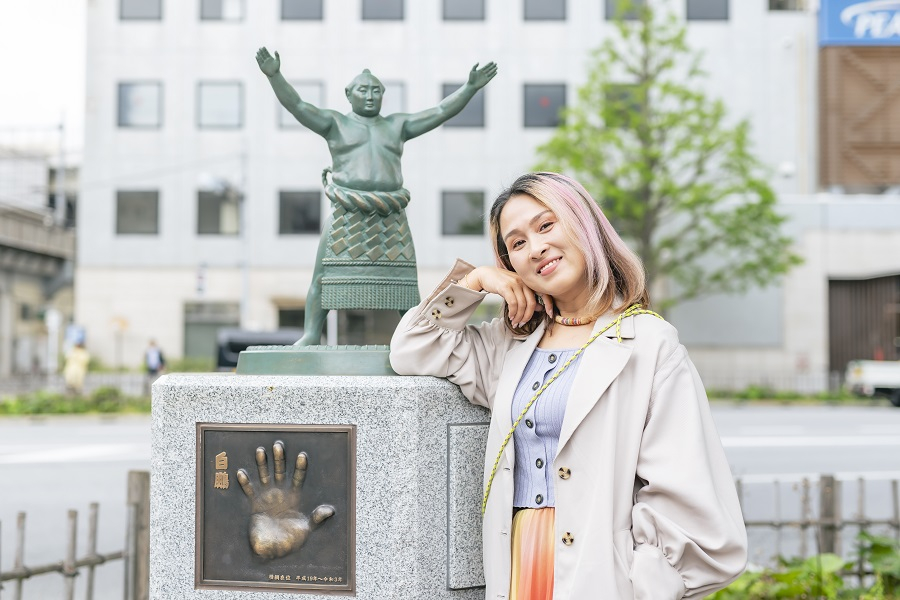
I was born in a place called Cha Cheong Sao, about 2 hours drive from Bangkok, the capital of Thailand. There is a big river that leads to the sea. It is famous for its fish.
I am from Nova Zagora, Bulgaria. Bulgaria is a country about the same size as Hokkaido, surrounded by mountains, and famous for its damask rose.
My grandfather on my mother's side was Japanese and my father's side is European-Brazilian. I am a third generation Brazilian of Japanese descent (Nikkei sansei).
I am from the state of Paraná, Brazil. It is a place with many Japanese pioneers and the second largest concentration of Japanese people in Brazil. It is close to Uruguay and is one of the colder regions of Brazil.
How cold does it get?
The temperature in winter is about 20℃. It is usually 30 or 40℃, so 20℃ is cold for us. Japan is too cold for me.
Chiang Mai, Thailand is cooler because it is in the mountains, but my town is hot. It is even hotter these days than when I was a child.
The climate in Bulgaria has changed in many ways, and winters are said to be warmer.
How Did You First Come To Know about Japan?
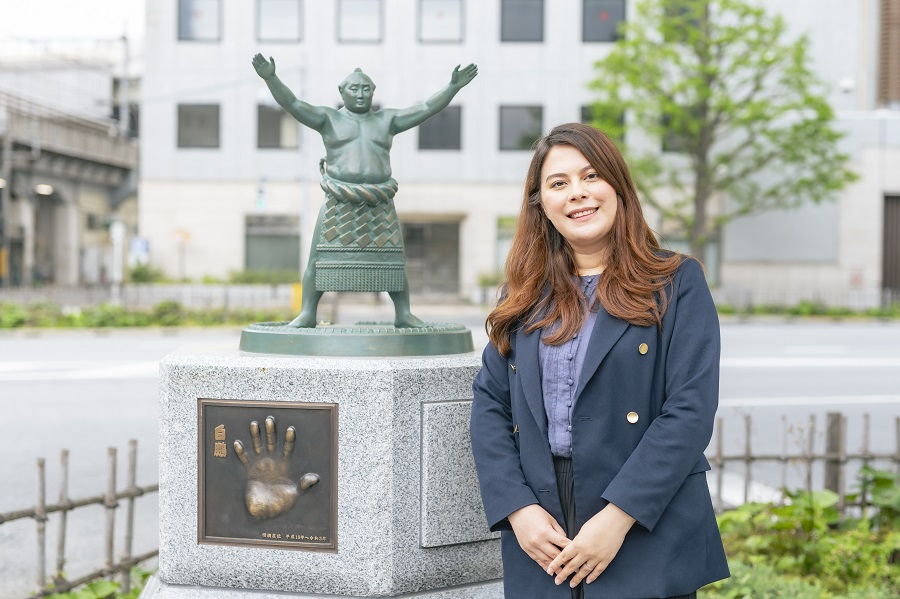
I first learned about Japan through the movie "Seven Samurai". I saw "Shogun" on TV as well. Since I was still a child, I had no particular impression of Japan.
I learned about Japan from manga and anime. On Saturday and Sunday mornings, I would watch Doraemon, Dragon Ball, Sailor Moon, Ikkyuu-san, etc. on TV which would start showing them from 8:00AM.
I lived with my Japanese grandfather, so Japan was a natural part of my life. Just like in Thailand, Dragon Ball, Hamtaro, and Yu-Gi-Oh were on TV every morning from 7:00 to 9:00. I think Brazilian children have a strong image of these anime when they think of Japan.
The same is true for Bulgaria. I had an image of great technology from electronics companies, but we don't have any connections that would make us want to go to Japan. We don't have many connections with Japan.
When I was a child, I thought there would be a lot of Nobita's houses from Doraemon. When I grew up, I saw Japanese movies and listened to Japanese music, so my impression changed. I came to Japan thinking it was a country with amazing technology, and Tokyo was really just like that image I had.
I had imagined Japan as a cutting-edge country with only bullet trains running. When I actually arrived at Narita Airport, I saw many fields and wondered, "Where are the tall buildings? Where are the flying cars?" I still remember this feeling like it was yesterday.
Q. What brought you to Japan?
When I was in my hometown, a friend told me that there was a Japanese person who wanted to learn gadulka, the instrument I was teaching. I could not speak English, nor could I speak Japanese, but she was working with JICA at the time and spoke Bulgarian, so I was able to teach her. Later, I married her and we came to Japan.
I came to Japan after marrying my Japanese husband. I was working for a Japanese company in Thailand at the time and I met my husband just when I was thinking I wanted to start learning Japanese.
My mother came to Japan when I was 1 year old. I had lived with my grandfather in Brazil, but when I was 10 years old, I was called upon to come to Japan. I had only met my mother 3 times by then. To be honest, I did not want to come to Japan. I had never lived with my mother, and she had remarried and had a new younger brother, so I felt uncomfortable about becoming a part of this family. I wanted to go back to Brazil, but I had no home to go back to since I came to Japan after my grandfather passed away. It was a situation that I was sort of putting up with, and there were times when I kind of hated Japan.
Tell Us About Your Current Work/Activities
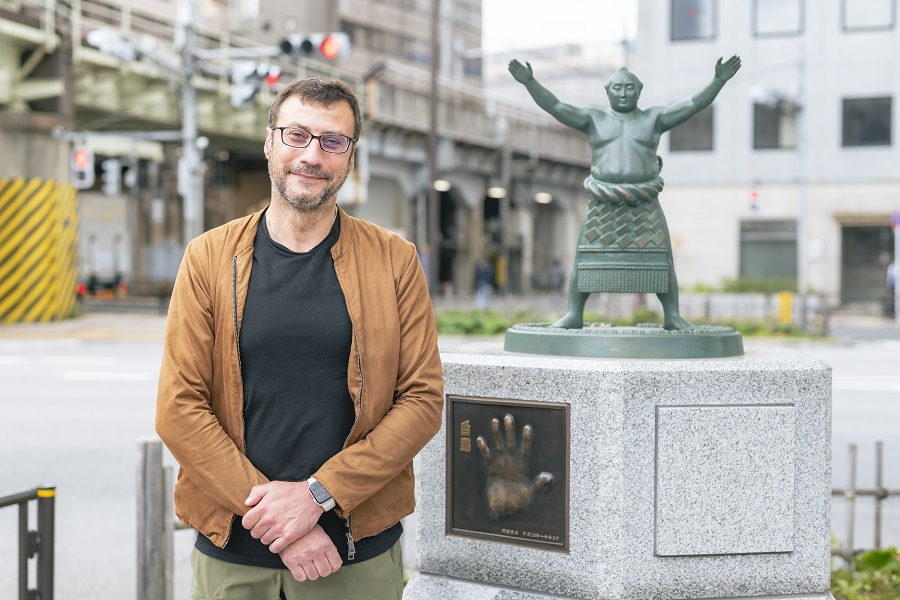
My work is music. I am a gadulka player, a Bulgarian folk instrument. My activities are live performances and events, and I have sessions with various people. I play with both Japanese and foreigners. They are wonderful musicians. I play not only Bulgarian music, but also various other kinds of music.
I am a Japanese language teacher and I teach Japanese. I teach mainly to children who, like me, came to Japan for their parents' reasons. Recently, I teach Nepalese, Thai, Chinese, and Vietnamese people more often than Brazilians. I teach them Japanese and also teach them the rules for living in Japan. I also teach Japanese in Portuguese to Brazilian adults.
My current job is as an influencer and YouTuber, providing various information about Japan for Thai people. I also have a part-time job. I started working part-time when my second son entered elementary school. Before that, I was a housewife. I wanted to try working for a Japanese company.
How Did You Get Started in Your Current Activities?
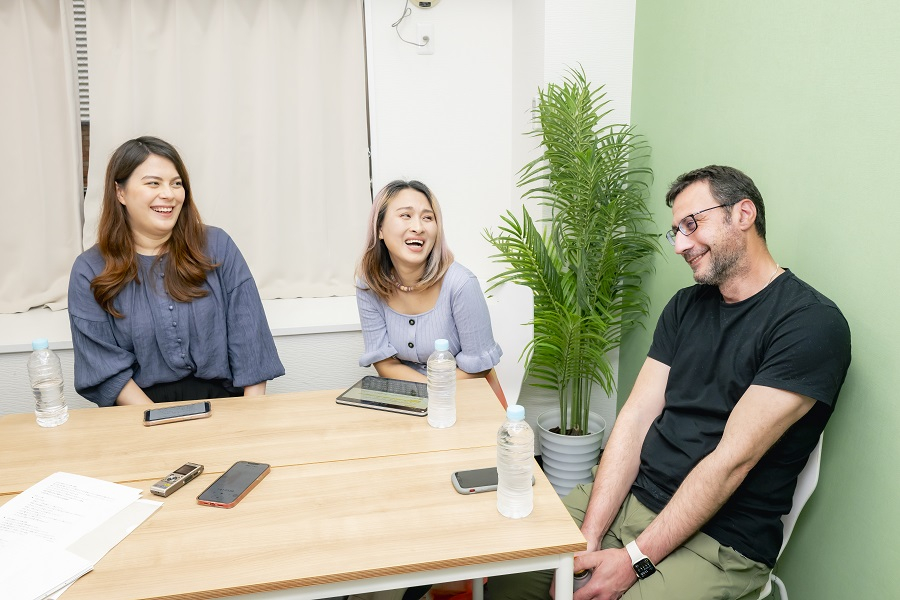
The reason why I chose Japan is also because I wanted to test how much Bulgarian music would spread in Japan. I have yet to meet a Bulgarian who plays a Bulgarian folk instrument in Japan.
The original motivation for me was that I saw a flyer at my university about a program to teach Japanese in Thailand, and I thought, "I want to go to Thailand!" (she laughs). But then I thought that teaching Japanese would be a job where I could use my experience and strengths, so I changed my major to Japanese language education and went on to graduate school.
Because I had struggled at school when I first came to Japan, I believe that I have a message that I can convey because of who I am.
I started YouTube when my children were young. At the time, there was a room on the website for Thai people living in Japan, and there was a community where you could ask questions and get answers from senior members of the community. I wrote articles and posted photos on the website, and gradually became well known. There was also a cosmetics room where I introduced Japanese cosmetics I had bought and made videos for friends who didn't know how to use them, which became very popular. My online name is "Madame Sashimi".
I recently went to Thailand and thought Japanese cosmetics are very expensive but popular. It would be useful to have a video on how to use them.
I know because I live in Japan, so by sending out information about my experiences and interests, it will be useful to those who will be coming to Japan. I speak as if I have a friend in front of me, so they may think of me as their friend, too.
Madame Sashimi? Interesting! I will definitely look it up.
How was the first session of work/activities connecting Japan and your home country? A YouTuber, a Japanese language teacher, and a performer, each special in their own way. What they have in common is that they are doing what they love and utilizing their strengths.
From the second session, we will ask them about their work and activities in a little more detail.
── Continued in the Following Issues
